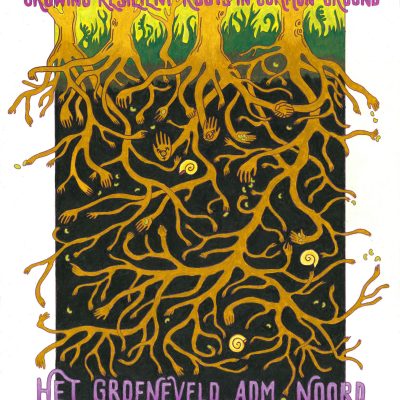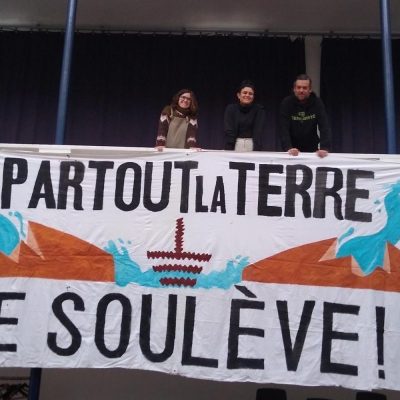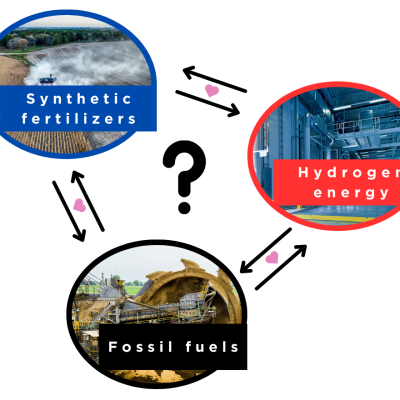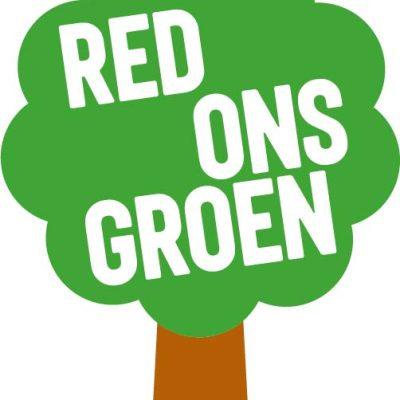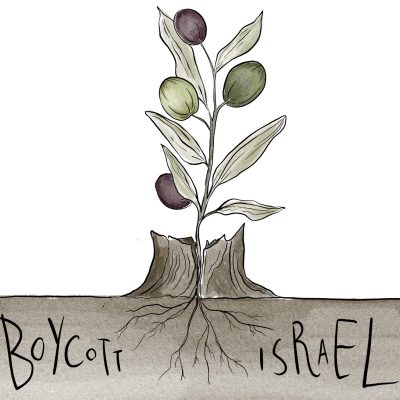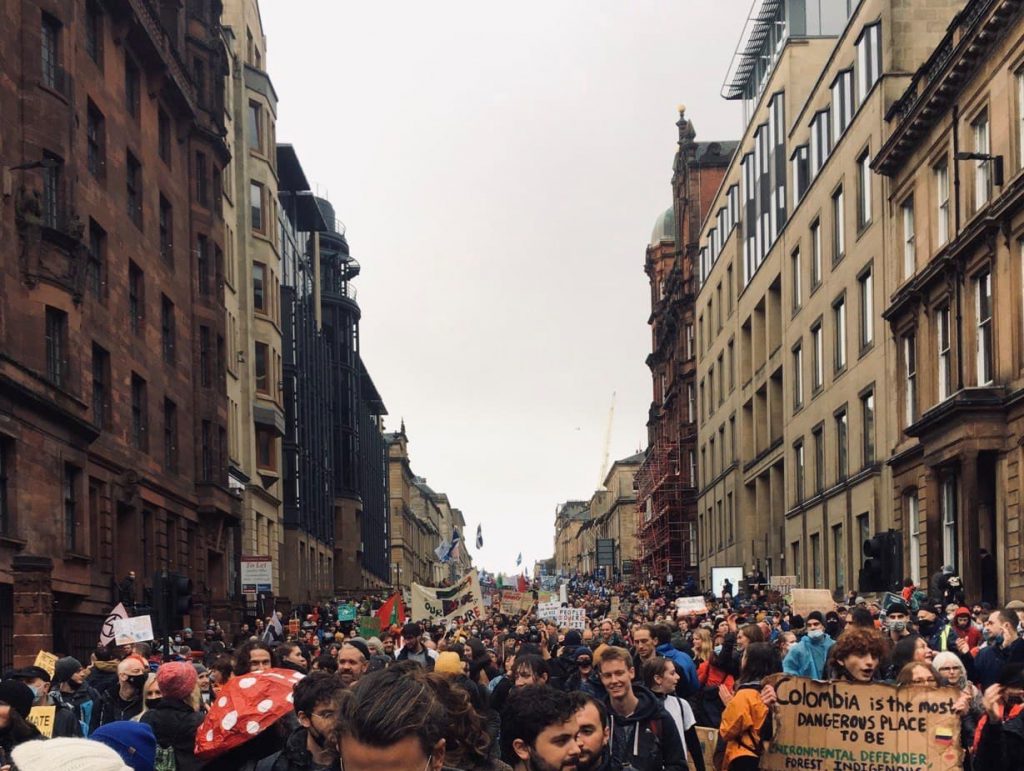
Q1: What is the COP26?
Since 1992 the countries of all governments within the UN meet almost every year in the Conference of the Parties (COP) to negotiate how greenhouse gas emissions should be reduced and how climate change impacts should be dealt with equitably. The main agenda item for COP26, the 26th meeting in Glasgow last November, was to finalize action guidelines. Also, the Paris Agreement was re-evaluated to see how net-zero emissions by 2050 can be reached, and to limit global warming to 1.5 degrees above pre-industrial levels.
Due to vaccine apartheid and racist Visa rules related to the pandemic, frontline communities and governments of countries from the Global South were hindered from attending the COP26. This increased lack of representation of those who are most impacted by the climate crisis.
more info at:
https://ricochet.media/en/3812/vaccine-inequality-simmers-at-climate-talks
Q2: Why did we get involved in the COP?
We joined the COP because we are concerned about the decisions that are being made for our futures…
…we are outraged about the way COP decisions-making are profit-driven instead of people-centred.
…we are outraged about the way revolving doors allow corporate interests to be greenwashed, mainstreamed, and endorsed into public policies.
…we are outraged about the way COP26 is supposed to address climate change but fails to address many aspects of it.
Revolving Doors, Corporate Lobbying & Greenwashed Promises
Decision making processes are profit-driven and deeply biased. Just consider that the Fossil Fuel Lobby counted over 500 delegates. Brazil, the country with the biggest delegation counted 480 members.
More info at: https://www.bbc.com/news/science-environment-59199484
As corporations hold large power in decision making processes during and around COP, the interests of industries are followed up on and any effective move towards climate action is prevented. Indeed, it is not a coincidence to spot the names of former members of industries and corporations as the new spokespeople and decisionmakers of public institutions.
It is not a coincidence that officials from the public sphere are appointed to positions in corporate jobs affiliated with fossil fuel industries. It is a corporate strategic move: Revolving Doors: a common strategy for lobbying and influencing decision-making. Employees from high ranks of the public sector are relocated to private sector jobs, and vice versa. This translates in introducing experitse, connections and often profitable private interests into the agenda. A common strategy for lobbying and influencing decisionmaking. The interests of fossil fuel industries find stage in public institutions: here it gets greenwashed, mainstreamed and is eventually endorsed into public policies.
Several activist groups have been denouncing these lobbying practices and showcasing the contradictions between the public promises and what happens behind the curtains.
Fossil Free Politics together with Corporate Europe Observatory, Friends of the Earth Europe and Food and Water Action Europe shed the light on 71 revolving door cases involving national governments and agencies, the EU, and international institutions) and six six fossil fuel giants (Shell, BP, Total, Equinor, ENI and Galp).
To know more: https://www.fossilfreepolitics.org/news-resources/stop-revolving-doors
The Glasgow Agreement reported a list of countries who have been bragging about the end of fossil fuel, while having planned oil&gas wells to be drilled until the end of 2022. Fun fact? The UK ranks among the ‘top drilling countries’.
To know more: Report ‘Drill Baby, Drill’ – https://glasgowagreement.net/en/drillbabydrill/
And when not directly staining their hands with such plans, Global North countries allow banks, insurance companies in their territories to financially support fossil fuel’s industry…hiding oil’s money and keeping it safe.Based on these premises, how can we continue to call the COP a climate conference when it becomes mainly a saloon to keep money flowing through its usual streams? The decisions that are being made so far prove to be smokescreens for business as usual. No real action is taken. Therefore, ASEED decided to join the People’s Summit, where people’s voices can rise, can be heard and can start conversations that can lead to real action.
The ‘Cow’ in the Room: bringing food systems to the table
The COP26 was supposed to address the climate crisis. Still, major components of the crisis were completely ignored. Among these, food systems and agriculture. From the use of land to the exploitation of fossil fuels, intensive production and the global supply chain of food are among the main contributors to climate change and perpetuate social injustices.
Why there is no substantial shift? Because the tentacular presence of corporate interests thrives on industrial agriculture & perpetuates polluting and inequitable food systems.
To continue business as usual, most discussions during the COP focused on ‘technological fixes’ and ‘innovation’. On the contrary, carbon markets, carbon sequestration technologies or net-zero approaches are not and cannot be the solution. They exacerbate the problem. On the one hand, such approaches arise from a typically western mindset: blind belief in the market and in a ‘scientific’ rationale and its future yet unproven technologies. They ignore the existence of solutions that lie in the hands of indigenous and other frontline communities. On the other hand, the very process of carbon removal poses some issues and risks. As a matter of fact, restoration tends to be planned by the Global North and imposed onto the Global South, shifting the burden away from the main polluters and disrupting the status quo of ecosystems and livelihoods. Moreover, these so-called solutions often do not solve anything but are rather used to greenwash the corporations in the Global North.
As ASEED we believe that our ecosystems reached a point of exhaustion where reparation practices are simply not enough. Instead, what we need are regenerative systems for healthier soil and folks.
find a similar take on: https://www.theguardian.com/environment/2021/nov/09/the-cow-in-the-room-why-is-no-one-talking-about-farming-at-cop26-aoe
Q3- How will the outcomes of the negotiations influence our food systems?
The heated conversations around fossil fuels and biodiversity will resonate in multiple ways in the way our food is produced. As a matter of fact, sustainable and just food systems are key to cutting emissions. Yet, they have been largely absent from the COP26 agenda.
Phasing out? Still eating though fossil fuels.
During the COP26, the countries came to the shrinked commitment to only ‘phase down’ fossil fuels, rather than to ‘phase out’.
Destructive profit driven practices are reframed and disguised as solutions rather than being confronted as the source of the problem. Indeed, “phasing out of fossil fuels” allows industrial agriculture to keep running business as usual. Throughout the entire industrial food system, fossil fuels are exploited from the artificial production of fertilizers to the supply chain infrastructure.
To learn more about the link between fossil fuels, synthetic fertilizers and industrial agriculture check out : https://aseed.net/nitrogen-fertilizer-faq/
Farming without farmers: A corporate led transformation of food systems.
The only relevant conversation on farming aimed at allocating more funds for agricultural scientific based innovation instead of small-scale sustainable farming. The Agriculture Innovation Mission for Climate (AIM4C) presented by Joe Biden in partnership with the United Arab Emirates envisions to move towards ‘climate-smart’ food systems. This translates into subsidies favouring big industrial farming complexes rather than small units of agroecological farmers. It cages knowledge, expertise and solutions within the ivory tower of scientists and technicians, with the risk of excluding local knowledge from small scale farmers.
More on: https://www.e3g.org/news/cop26-agriculture-and-land-takeaways/
In the momentum of fossil fuel bans, corporations are urged to rebrand their image and explore new commodity frontiers. Disguised as the safeguards of food provision, corporations are now targeting and monopolizing seeds. Privatizing specific traits of plants and seeds will translate into shrinked genetic diversity of seed varieties, ruling out of small farmers and breeders, jeopardizing food production. Posing overall risks for agro-biodiversity, food sovereignty and food security. Despite being a crucial threat to ecosystem’s wellbeing, the corporate hijack of seeds and their genetic resources was not brought to the table. Conversations mainly focused on safeguarding land, oceans and forests habitat through restoration schemes such as REDD+ and carbon markets. Once again, quick technological fixes are smokescreen.
https://www.no-patents-on-seeds.org/en/background/problem
Seeds for change
Outside the patrolled arena of the COP26, the People’s Coalition on Food Sovereignty, a growing network of grassroot food activists and peasant-famers announced that 566 groups from 78 countries have endorsed the Declaration that calls for people’s rights to just, equitable, healthy, and sustainable food systems and the end of corporate monopoly control.
More info about the Declaration: https://peoplessummit.foodsov.org/gps-declaration/
Q4- Who is affected by it?
The outcomes of the COP26 affect all the 197 countries involved. However, they do so in very different ways. The climate summit’s exclusionary, corporate-biased, illegitimate decision-making exacerbates injustices and maintains global power in the hands of Global North countries.
Playing it safe for whom?
Besides the issue of unjust access of the COP, injustices are perpetuated in the discussions and agreements in the way responsibility is shifted and commitments are formulated. A major topic in this regard is the climate finance. During the last COP, a funds for adaptation and mitigation of 100 billion dollars annually was agreed upon to be allocated by 2020. The funding would have allowed vulnerable countries to have budget to mitigate climate change by developing means to lower emissions and to adapt to the impacts of climate change. However, this sum has not been reached yet and is projected onto projected onto 2023. The COP26 was also meant to discuss the development of a fund for loss and damage to address, minimize and respond to irreparable, permanent losses and damages already linked to climate change. This should cover all those effects of climate change that cannot be adapted to, such as extreme weather events, temperature, and sea level rise. The fund was blocked by rich nations like the US, the UK or countries of the European Union. Instead an other dialogue is planned to discuss it further.
The outcomes of these decisions will resonate mainly on the ecosystems at the core of the climate crisis. Global South countries are geographically the most exposed to such risks despite historically being the least responsible of environmental impacts. Most of them share a history of colonialism that lasts up until today’s neo-colonial practices. This further exacerbates inequalities and shutters any hope for solidarity and responsibility between the blocs.
More info about the funds here:
http://priceofoil.org/2021/11/13/can-international-cop26-reaction/
https://www.nature.com/articles/d41586-021-02846-3
Injury and Insult
The COP26 failed to address the “common but differentiated responsibility” that would take into account the historical responsibility of the Global North in climate change.
The discussion around climate finance only focused on high-rate loans, rather than grants. This translates into only heavier debts of already financially precarious economies. Simultaneously this means that Global North countries continue to make profit on the back of Global South countries. Instead of acknowledging differing responsibilities in the climate crisis, all countries are given the same responsibility to meet the current emission gap. This is another symptom of entrenched colonialism in geopolitics and ‘climate responsibility’.
More on climate finance at COP26 here: https://commonslibrary.parliament.uk/cop26-delivering-on-100-billion-climate-finance/
Another matter of heated debate concerned the final text of the Glasgow Climate Pact: only committing to ‘phasing down’ of fossil fuels rather than pursuing their ultimate ban. The commitments were further rephrased, merely targeting “unabated coal power and inefficient fossil fuel subsidies” thus leaving huge loopholes for carbon storage capture (CCS) and “efficient” subsidies for fossil fuel projects. Moreover, the text did not mention other fossil fuels, oil and gas, which allows Global North countries to continue business as usual: ignoring the responsibility of such investments as major drivers of displacement, pollution and biodiversity degradation.
Mainstream media has pointed its reflectors on India for weakening the commitment in the final text. Yet, there seemed to be no contextualisation of global equity. India had suggested to address all fossil fuels in an equitable manner, but an equitable fossil fuel phaseout would place most of the burden on countries from the Global North. When India called out this inequity, they were portrayed as obstructionist blocking the first-ever mention of fossil fuels in a UNFCCC text. Moreover, phasing out of fossil fuels means outsourcing the energy production to the Global South while developing the profit driven green solutions to for the North.
more info:
civilsocietyreview.org

